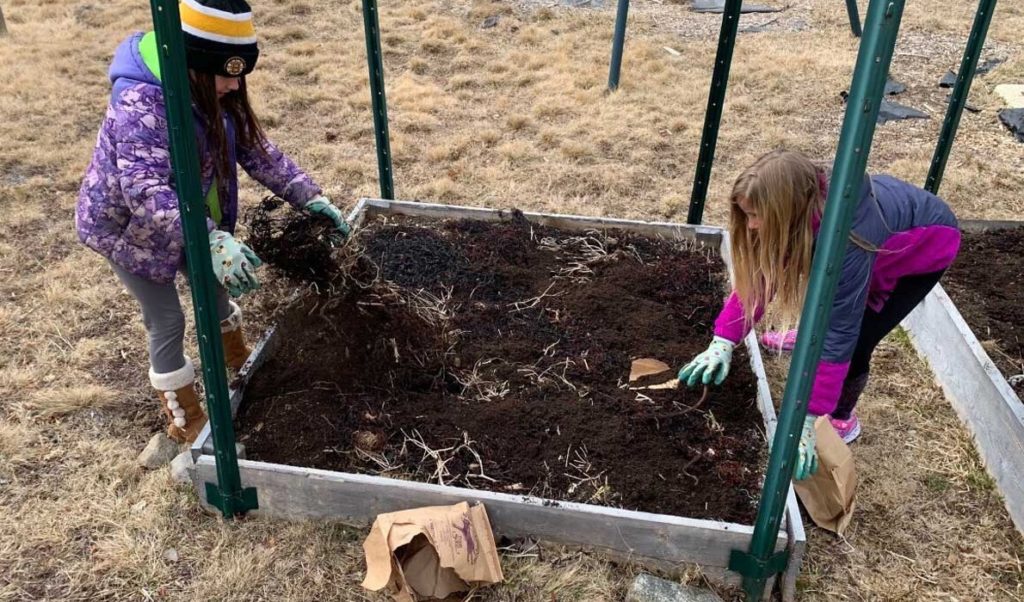When I moved to Maine four years ago, I quickly observed that Mainers are resourceful, creative problem-solvers. I have noticed this is particularly true of islanders, who, by necessity, take extra care to think about resources available on-island and how and when they come and go.
When COVID-19 made its way to Maine, residents carefully adapted behaviors and systems to reduce the strain on our healthcare systems and stores. Schools shifted to remote learning, and families stayed home, except for essential work and tasks like grocery shopping.
But imagine needing to go to the mainland to get your groceries. That’s a reality for several islands, including Frenchboro, which has no grocery store on-island and relies on a single roundtrip car ferry each week.
Frenchboro teacher Laura Venger explains:
“With no store on the island and a limited ferry schedule, Frenchboro has always been host to home gardens, but the pandemic helped refocus the importance of growing food locally,” she said.
When school began using remote learning, Island Fellow Natalie Hyde-Peterson and Venger and agreed continue the planned garden program, if they provided equipment for students at their homes.
“We got parents and administration on board, then ordered raised beds, seeds, organic soil, and much needed crop cages to keep the deer out. We wanted students to have the most successful experiences possible in growing their own food,” Venger said.
This example of swift problem-solving, collaboration, and creativity addressed both curricular and community needs.
Hyde-Peterson described the challenge.
“It was interesting to go from gardening at school, where activities are packaged and curated for everything to go smoothly with a group, to sending garden kits home where suddenly every student was responsible for every aspect of their own garden,” she said.
“There were no teachers or adult volunteers—besides parents—doing work behind the scenes and trying to interpret tasks for different grade levels,” she explained. “Every student had to learn how to grow all of their crops from start to finish and maintain a healthy garden.”

Students embraced a new level of responsibility and independence working on their home raised beds, referencing a “Gardener’s Handbook” Natalie had written as a resource, and meeting weekly with Ms. Venger and Natalie to provide progress updates. Throughout their projects, students practiced math and geometry, ecology and engineering, and presentation skills, while also growing fresh produce.
Seventh-grade student Breanna shared an unexpected challenge:
“The crop cage kept on blowing away but I solved the problem. The buckets that were holding the rocks kept slipping off of the crop cage, but now I use a sand bag and a grocery bag with rocks in it to hold it down and it’s been doing great.”
In May, Frenchboro students virtually presented their garden projects to peers on Monhegan, Cliff, Isle au Haut, and the Cranberry Isles. All part of the Outer Islands Teaching and Learning Collaborative (TLC), these one room schools already collaborate for virtual book groups, student council, holiday parties, and in-person field trips.
During presentations, Breanna taught about the square foot method, dividing the area of her raised bed into square feet to determine how many and what kinds of crops she would have space to grow. Fourth-grade students MaKayla and Chloe explained how they assembled the raised beds and the importance of site selection. Students observed potential locations, taking photos every hour to ensure there was enough sunlight. Presentations concluded with time for questions from TLC peers
Of course, we all asked what the students chose to grow. They shared excellent advice: grow what you like to eat! Radishes, carrots, lettuce, green beans, yum!
Breanna shared an update in July: “I have been getting lots of lettuce and my tomato plant is flowering. My lettuce tasted great—it was the best lettuce I ever had. My family makes salad almost every night using our garden lettuce.”
As students’ families eat veggies from their own gardens, the broader Frenchboro community also accesses fresh local produce. This spring, while the students grew produce at home, Hyde-Peterson increased production at the already established school gardens, and by early July had already provided over 30 pounds of fresh produce to the Frenchboro community.
Robin Chernow is a community development officer with the Island Institute, focusing on education.





